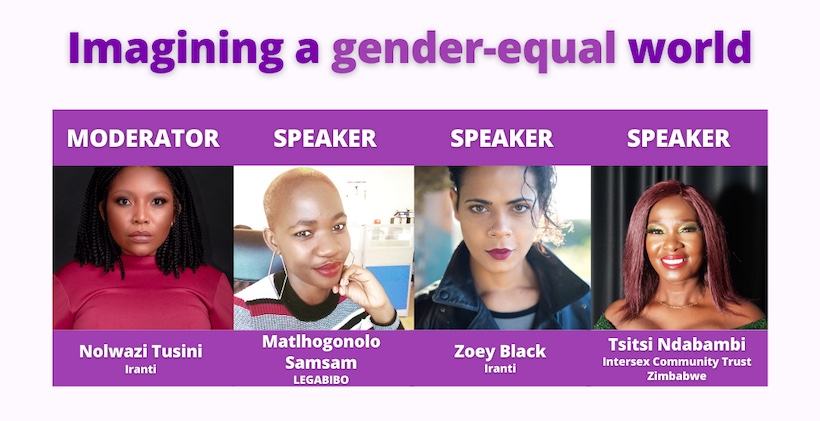If we were to imagine a gender-equal world, what would it look like?
For speakers on the Iranti International Women’s Day Twitter Space held on March 8, it would be a world where womanhood is inclusive and diverse. Lesbians, Gays and Bisexuals of Botswana Acting Education, Awareness and Communications Manager Matlhogonolo Samsam said she imagines a world where diversity is as “normal as breathing”.
“When I think of an equal world, I think of equal opportunities and equal resources for everyone” Samsam said.
The Iranti Twitter Space was titled “Imagining A Gender-equal World” and gave LGBTQI+ women a space to reimagine themselves and share the complexities of existing in a world that does not always affirm their existence.

Moderating the discussion, Iranti Communications and Media Manager said queer people – as oppressed people – have had to reimagine themselves.
“When people have to exist in a space that says that they are less than human, they have to do a lot of work of imagining themselves into being” Tusini said.
Today’s world is unbalanced and disproportionately affects women and minority groups. UN data highlights that women – particularly queer women – often face several blows of discrimination.
“Women form the majority of the world’s poorest people and the number of women living in rural poverty has increased by 50% since 1975” says a UN Human Rights article.
For women part of the LGBTQI+ community, discrimination is further compounded, with the UN highlighting LGBTQI+ persons generally face intersecting biases and prejudices.
“The intersection with racial discrimination, on the grounds of race, colour, descent, national or ethnic origin, makes LGBTQI+ people even more vulnerable to discrimination and hate-motivated violence” the article says.
As a transgender woman in South Africa, Iranti Media and Communications Specialist, Zoey Black, said she has seen how the definition of womanhood is narrowed to fit in a specific type of woman that is cishet.
“From the get-go, the concept isn’t necessarily inclusive from its inception, and I think that is a fundamental problem that we need to shift” Black said.
While patriarchy is often pointed to as a key driver of gender exclusion, Iranti Intersex Programme Officer Crystal Hedricks said women are often harmful towards each other.
“As women in South Africa and also in Africa as a region, I think we need to get to the point where we realise that genitalia does not make up someone’s gender. If I say I am a woman, I am a woman” Hedricks said.
Tsitsi Ndabambi, Intersex Community Trust Zimbabwe Executive Director said there is a “rat race” among women where there is constant competition.
“We also need to find a way to stop it and to accept each other as women, and just appreciate and enjoy our womanhood” Ndabambi said.
